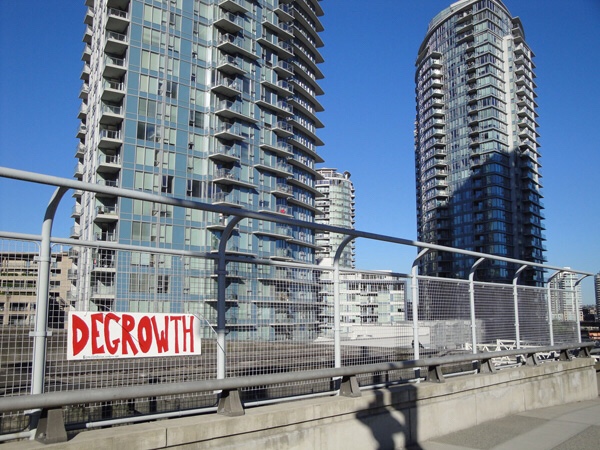The Earth Wind and Fire issue of Jacobin is an environmentalism from the standpoint of the Progressive State. Economic growth is given and natural, it happens, social forces can slow it down or it can be accelerated. Nature on the other hand, bereft of value bearing physis, is a curious mix of a sum of externalities and an aesthetic experience.
By Eric Pineault*
Editors’ note: This is the final part of the fourth post in a series of ENTITLE blog articles that critically engage with the ongoing discussions about “eco-modernist socialism” and “communist futurism”, projected in Jacobin magazine’s climate change issue ‘Earth, Wind, and Fire.’ Our series continues the debate with critical insights that question the foundations of these proposals; in particular, whether they imply a substantive transformation of current capitalist socio-ecological regimes, or their continuation and even expansion. The series had featured posts by Aaron Vansintjan, Stefania Barca, and Emanuele Leonardi.
This construct, through the appropriate mobilization of physis bearing technology and labour can be managed productively and beneficially for human societies as a system. As Peter Frase points out in “By any means necessary” we’ve been doing this for over a century with the global nitrogen cycle, this modern experiment is presented as a blueprint for the active management of other supposed “environmental limits and constraints”, such as the carbon cycle, biodiversity or net primary production on the land and in the seas.

So manage we must and manage we will to ensure the growth of our material production and consumption. Growth is the trajectory from scarcity to post-scarcity and the basis for material emancipation, which is the foundation of social emancipation. To critique growth is idealistic, moralistic and reactionary. Ecomodernism and accelerationism reenact and radicalize the commitment of socialism to an imaginary colonized by the theory of Progressive State. Anything but limits!
Nowhere is this more obvious than in the obsessive enthusiasm which permeates the discussion of energy in the proposed Think Big Socialist Society. A given is the energy intensity of the current material world in the most advanced outposts of the capitalist core. The technical problem is to harness enough energy without burning fossil fuels and then to develop a global, just and efficient system of distribution. Of course limits are social, not natural, and thus appear as barriers that can be overcome, like the atavistic attachment of rural communities to landscapes unspoiled by massive “green” energy infrastructure necessary to maintain high energy urban lifestyles.
That we must preserve the energy intensity of modern capitalist societies of the core leads many contributions in the issue unto a quest to find the technofixes that will deliver this outcome. We are presented an ensemble of promethean technologies set to revolutionize our material world, combined with a mass redeployment of human labour that will reconstitute a progressive and militant working class. Physis on steroids.

Think Big Socialism’s materialism is in a very classic way attuned to the realities and experiences of working people, but it remains tone-deaf to the biophysical limits of the real natural world. Extending –ecologizing– materialist analysis to take into account biophysical reality as done by other schools of ecosocialism and Degrowth, would imply parting with a core cultural imperative of growthism: that the progressive development of the modern world is based on the material continuity from advanced capitalism to socialism, which includes electric toothbrushes, vibrators, nuclear reactors and many of the other objects that populate the world.
Capitalism has providentially but irrationally developed the forces of production that have brought us to the doorstep of a green post-scarcity socialism. The clash with Degrowth’s “ecological materialism” couldn’t be more violent.
Taking into account biophysical limits to growth, the objectivity of scale and acknowledging the deep unsustainability of current levels of material and energetic throughput in the capitalist core has the following implications:
1. Moving away from the ecological contradictions of advanced capitalism implies the descent of energy and material intensity in the capitalist core rather then continued growth.
2. An ecosocialist society is premised on a radical break in the material continuity of contemporary society – in particular those systems and infrastructures that are necessary for “bigness”, the complex and mass systems of production, consumption and coordination. The critique of the material basis of advanced capitalist society is not only ecological, it also rests on a social basis, these systems tend towards alienation, we don’t love our monsters, nor should we.
3. A transition in the shape of the “Last Stimulus” – a grand eco-modernist Keynesian investment push would have deep multiplying and rebound effects: the harder the push, the deeper the growth effects. And thus relative gains in “eco-effeciency” would be lost to absolute growth of ecological constraints. Or they could be offset by coercive measures–not very emancipatory.
Of course there is a political advantage to denying these limits for the progressive left.
For Degrowth and other ecosocialists this is probably our greatest political and cultural challenge. How do we convincingly articulate emancipation and limits? How do we break the barriers of ecological denial? For every ecological contradiction that we will put forward, a technological work around will be imagined, boosted with the possibility of creating a well-paid unionized green job. By the time an ecological materialist has gone through EROI, rebound, entropy and externalization, his attentive interlocutor has moved on and shut himself off in denial.
We cannot but agree with Jacobin that a red-green common front is the only relevant and effective means of acting on and maybe even capturing the current effort of ecological transition. Where we -and other eco-socialists- disagree is the basis of this alliance.
Material continuity, replacing every dirty joule with a clean joule, promothean technological breakthroughs, full employment with massified production, massified consumption and massified democratic coordination as a basis for such an alliance has the advantage of being culturally reassuring. It doesn’t challenge the left’s interpretation of modern society’s progressive imaginary and its basic premise: material emancipation as the basis for social emancipation. And hey, in this future post-scarcity socialism we might end up in the promised land of full luxury automated communism. Or not.

And this is because from a biophysical perspective, these scenarios either contradict the basic laws of thermodynamics and what we know of the biogeochemical cycles of the planet; or they imply the displacement/externalization of the entropy and ecological forcings generated by the social metabolism inherent to Think Big Socialist utopias. The question then becomes: which places, societies or life forms will these constraints be displaced too?
If the basis for this alliance is to be a political ecology of equality, justice and autonomy inside biophysical limits, then we must put forward the question of scale. This further implies confronting the cultural lines of defense of the metabolic status quo and its ecological consequences. And we must do this by articulating social emancipation and limits, not through their sterile opposition.
Eric Pineault is a professor at the University of Québec in Montreal. He teaches political economy at the Department of Sociology and Ecological Economics at the Environmental Sciences Institute. His research focuses on the growth dynamics of advanced capitalism as well as on extractive capital and extreme oil in Canada.





Reblogged this on Political Ecology Network.